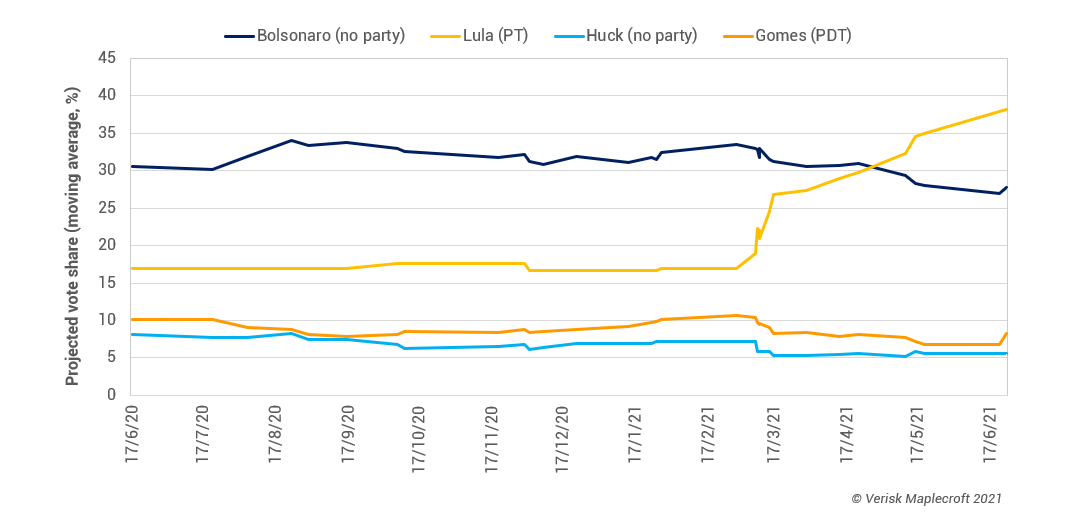Brazil’s president, the controversial right winger Jair Bolsonaro, has to date managed to shrug off any challenge to his control over the country despite his epic mismanagement of the pandemic, a series of corruption scandals, and swelling popular discontent. However, the conditions that have allowed him to survive thus far are rapidly decaying.
The disorganised response to the pandemic, and the resulting death toll, remain the key drivers behind voters’ rejection of Bolsonaro. A tsunami of negative news stemming from the parliamentary enquiry commission, the CPI, tasked with investigating the handling of the outbreak, is accelerating the erosion of the President’s popularity - and slowly corroding his re-election bid. The most recent scandal, centred around corrupt procurement in vaccination contracts, has added further fuel the to the fire.
The public now also has a viable candidate to support in the shape of former President Lula da Silva. Lula’s comeback to the political ring has acted as a focal point for the opposition and disenfranchised voters to rally around. Da Silva can coalesce opposition to Bolsonaro in a way that nobody else in Brazil could before.
This impacts Bolsonaro’s approval among vulnerable groups, who benefited from the additional government spending last year, but bore the brunt of the health system’s collapse during the worst of the pandemic. Bolsonaro's rejection rate is now at a record high, up by 11% since February to 62.5%, while his voter support continues to shrink. July numbers show an average of 28%, in contrast to Lula who is polling at 42%.
Impeachment unlikely, but so is victory at 2022 elections
The question now is whether Bolsonaro will be denied a second term – and if so, by whom? The Supreme Court and Congress could have a role to play in any impeachment process. But even if there is no impeachment, voters will have their say in the general elections due on 2 October 2022.
Learn more about our Country risk intelligence
Political will for impeachment is rising fast, with 11 different parties filing a “super-impeachment” request listing 23 offences. The future of this process is unclear, but there are two major signposts to watch. Firstly, whether the centrão (a resilient coalition of ideologically malleable and self-serving parties) continues to support the president through the ongoing vaccine scandal; and second, if Vice-President Hamilton Mourão starts hinting what his transition administration would look like, reassuring the political establishment that there would be some stability and reliability in a post-Bolsonaro electoral year.
Should Bolsonaro successfully navigate his way to the 2022 general election, his chances at the ballot box are far from good. Our statistical moving average of the vote share for each of the main potential candidates for the 2022 election shows that Lula’s chances are growing steadily in the first round.
Given the current social mood, a coalition led by Lula’s left-wing Workers Party (PT) has a substantial chance of electoral success and poses the highest risk to Bolsonaro’s re-election bid. And despite being one of the hardest-hit parties in the 2016 local and 2018 national elections, the PT remains competitive at all jurisdictional levels with a broad geographic footprint. With Lula’s return, no other left-wing force would be able to designate a more competitive candidate.
The road ahead will stress test Brazil’s democracy
President Bolsonaro has, however, proved surprisingly resilient. He has not faced a widespread crisis despite his administration’s failure to act in response to the pandemic. International pressure over environmental policies, and a multitude of corruption allegations, have also failed to weaken the administration enough to threaten an early change in government.
However, incentives for abandoning Bolsonaro are growing. But with the opposition failing to get enough votes to launch impeachment – currently, more than 200 seats short of the necessary majority – the President does not appear to be in terminal trouble quite yet. Indeed, the most likely scenario is that Bolsonaro will survive until the general vote.
The question then will be whether he will attempt to emulate former US President Trump and question the fairness of the elections before ballots are cast. Ensuring a transparent process and an orderly transfer of power in a highly polarised society will be the biggest challenge Brazilian democracy will face in the 21st century.
